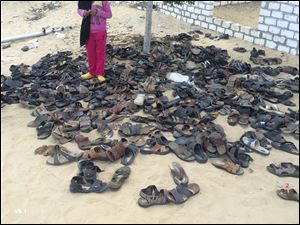
EDITORIAL
The death of 300 in Egypt
11/29/2017The attack on the mosque in Sinai, on a Muslim holy day last week, which killed more than 300 worshipers, is evidence that Islamic extremism is by no means dead. It also shows that the regime of Egyptian President Abdel-Fattah el-Sissi is by no means secure in its rule.
The attack is part of two ongoing phenomena in Egypt: The first is a series of attacks on religious minorities. The victims were previously mostly Christian, members of Egypt’s Coptic minority. Now the attack on the predominantly Sufi Muslim mosque in Bir al-Abed has added Sufis to the list. Sufis include the so-called whirling dervishes, who are considered heretics by the Salafi, Saudi Arabia-oriented Sunni Muslims who form the majority of both the Islamic State and al-Qaeda groups.

Discarded shoes of victims remain outside Al-Rawda Mosque in Bir al-Abd northern Sinai, Egypt. a day after attackers killed hundreds of worshippers.
Click here to view more Blade editorials
The second alarming aspect of the Bir al-Abed mosque attack is that it illustrates that Egypt’s government and armed forces are not in control of the country, in spite of ostensibly being in charge in Egypt since 2013. The government has not been successful in its efforts to defeat Islamic extremist forces in the Sinai or to assure security in the rest of the nation.
That government came to power via a coup d’etat, but the United States under President Barack Obama, in spite of laws denying military aid to governments taking power in this way, maintained U.S. military assistance to Mr. Sissi and his regime.
The problem now is that the government lacks support among the Egyptian people. It is therefore not in position to aid in the fight against Islamic terrorism.
Sensible U.S. policy at this point would be to urge free and fair elections in Egypt, in pursuit of a leader capable of mobilizing the population, including the minorities, behind him.